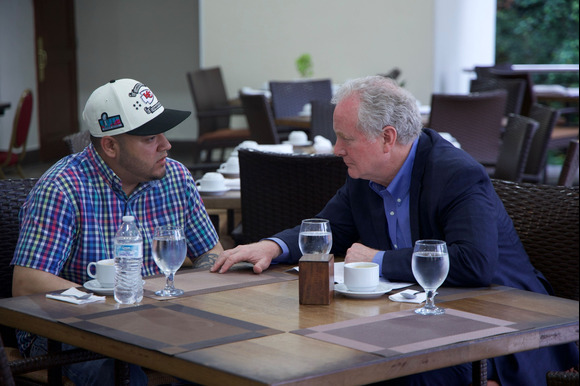Kilmar Abrego Garcia, a Salvadoran national whose controversial deportation case has drawn international attention, has once again been taken into custody — this time after voluntarily reporting to a US Immigration and Customs Enforcement (ICE) field office in Baltimore.
US Secretary of Homeland Security Kristi Noem confirmed his detention in a statement, saying that ICE officials are now “processing him for deportation.”
The move comes months after Mr. Abrego Garcia was mistakenly deported to El Salvador in March, where he was briefly confined to the country’s infamous Cecot prison. Following an admission by US authorities that his deportation was the result of an “administrative error,” a federal judge ordered his return to face criminal charges in the United States.
Now, his lawyers claim the US government is threatening to deport him to Uganda after he rejected a plea deal, accusing officials of attempting to pressure him into admitting guilt. “The only reason they’ve taken him back into detention is to punish him — to punish him for exercising his constitutional rights,” said Simon Sandoval-Moshenberg, a member of his legal team, speaking to reporters outside ICE’s Baltimore office.
Mr. Sandoval-Moshenberg confirmed that his client has filed a fresh federal lawsuit in Maryland, challenging his detention and any potential removal “to Uganda or any other country” until his criminal trial is resolved. A federal court quickly issued a temporary order barring the government from deporting him or altering his legal status until 16:00 on Wednesday, unless the judge decides to extend the restriction.
The case has been assigned to US District Judge Paula Xinis, who presided over the initial lawsuit regarding Mr. Abrego Garcia’s mistaken deportation to El Salvador.
His attorneys say he previously declined a government offer to plead guilty to human smuggling in exchange for deportation to Costa Rica. When he reported to ICE in Baltimore on Monday as required, officers unexpectedly detained him. According to his lawyers, ICE officials provided no clear explanation for the arrest, only saying he would be transported to a detention center without specifying the location.
Mr. Abrego Garcia had been under ankle monitoring since his release last week, a condition his attorneys argue made detention unnecessary. “He was essentially on house arrest already,” Mr. Sandoval-Moshenberg noted.
Supporters have voiced concern that Mr. Abrego Garcia could now face deportation to Uganda, a country where he has no known connections. Dozens of backers rallied outside the ICE office in Baltimore to protest his detention, insisting his immigration ordeal has been marred by government overreach and repeated violations of due process.
Homeland Security Secretary Noem, however, painted a starkly different picture in her statement, accusing Mr. Abrego Garcia of human trafficking and domestic abuse. “President Donald Trump will not allow him to terrorize American citizens any longer,” she said.
The US government has in recent years signed bilateral deportation agreements with Honduras and Uganda as part of the Trump administration’s broader crackdown on undocumented immigration. Internal government documents obtained by CBS News — the BBC’s US partner — reveal that Uganda’s foreign ministry has indicated it would prefer individuals sent under such agreements to originate from African countries.
The long-running saga of Mr. Abrego Garcia’s case began in March when he was removed to El Salvador, his country of birth, and imprisoned in the Cecot facility, notorious for its harsh conditions. After a US judge ruled that the deportation was unlawful and stemmed from bureaucratic mishandling, the government was ordered to arrange his return.
Upon reentry, he was sent to Tennessee, where he was charged with involvement in a human smuggling operation. He remained in custody until his release last Friday, when a federal judge granted temporary freedom under strict monitoring. Mr. Abrego Garcia has pleaded not guilty to the charges.
Now, with a second detention underway and the threat of deportation to Uganda looming, the case has reignited fierce debate about the Trump administration’s immigration policies and its handling of controversial deportations. For Mr. Abrego Garcia’s supporters, the latest development represents not just a legal battle, but a test of constitutional protections. For the government, it is another front in a hardline push against illegal migration.






